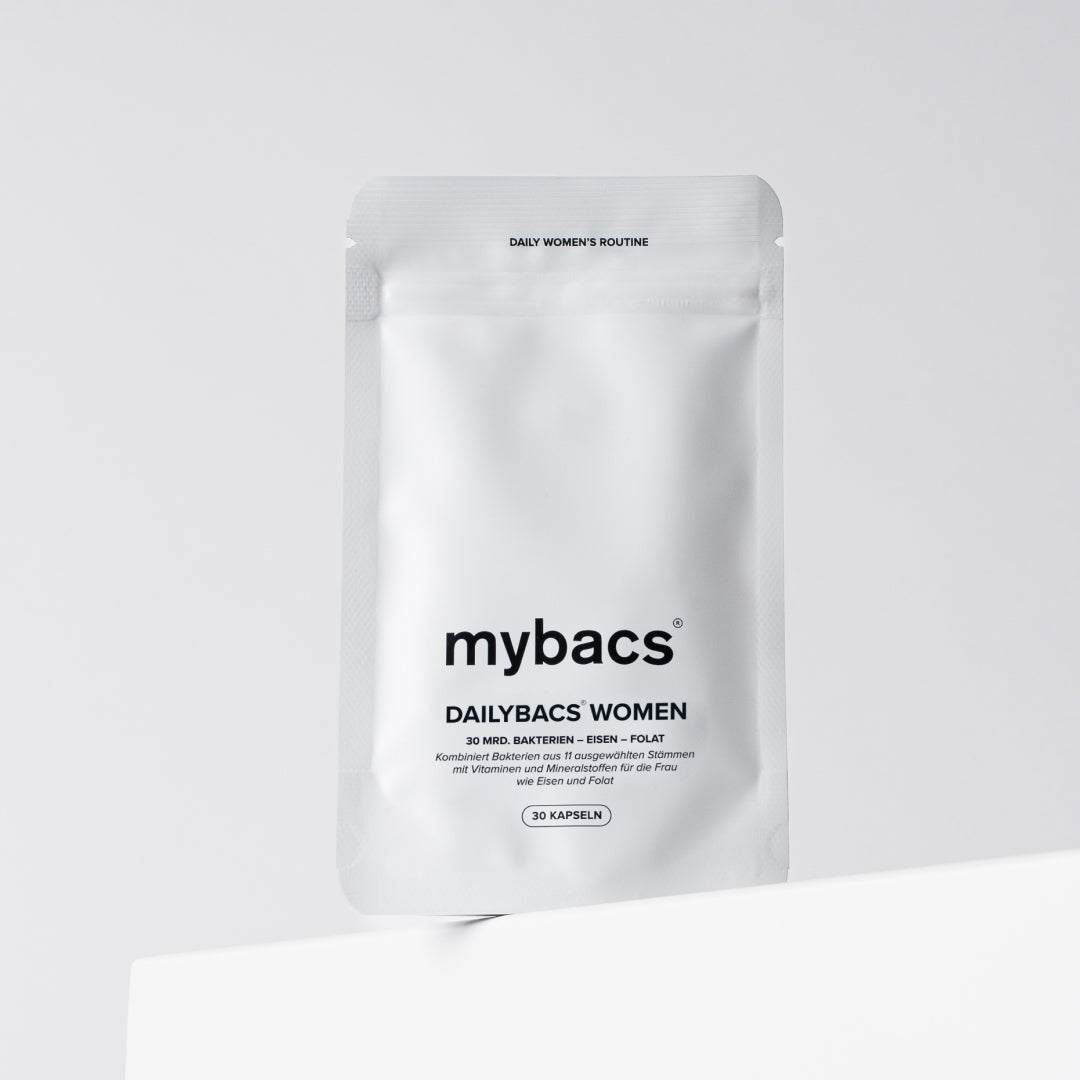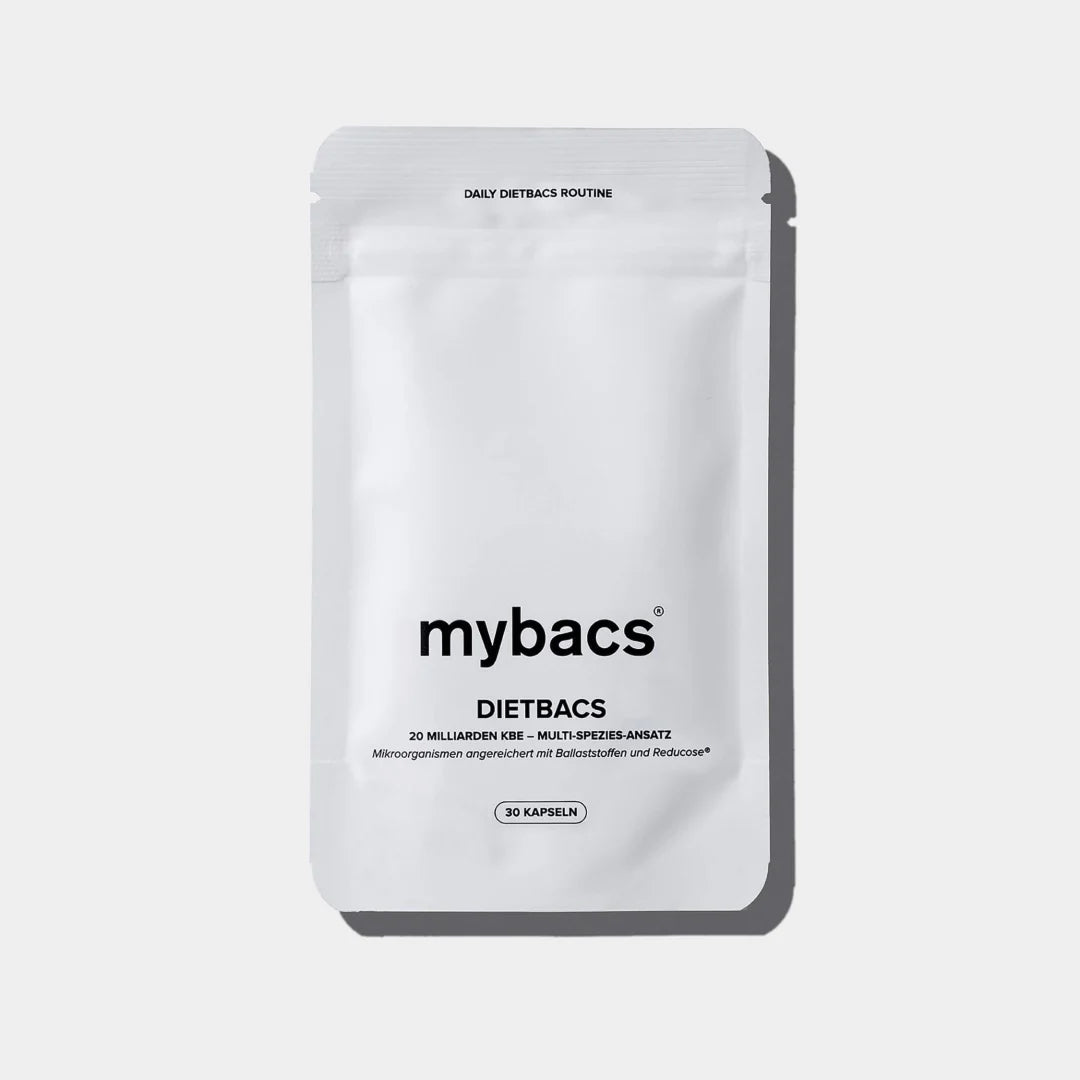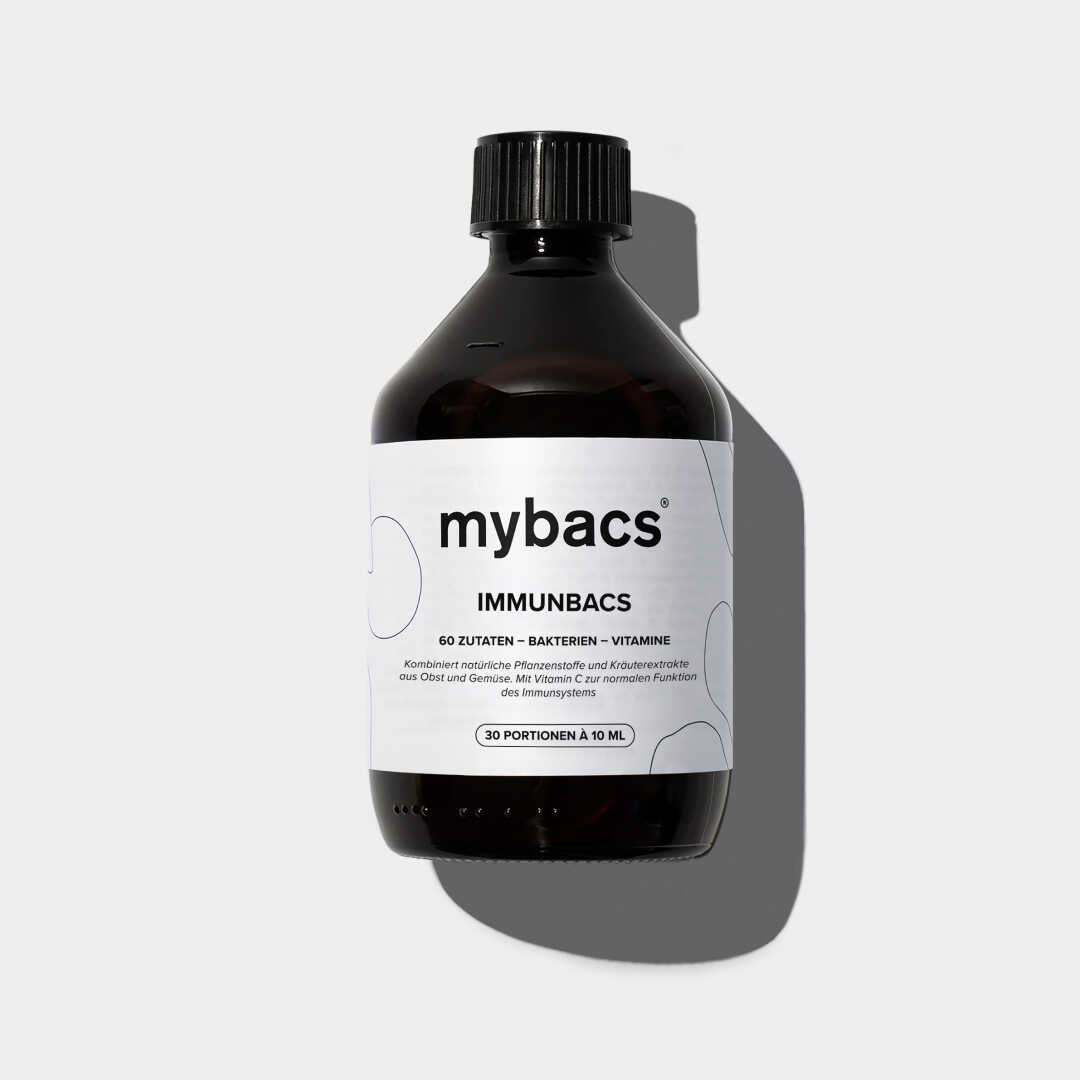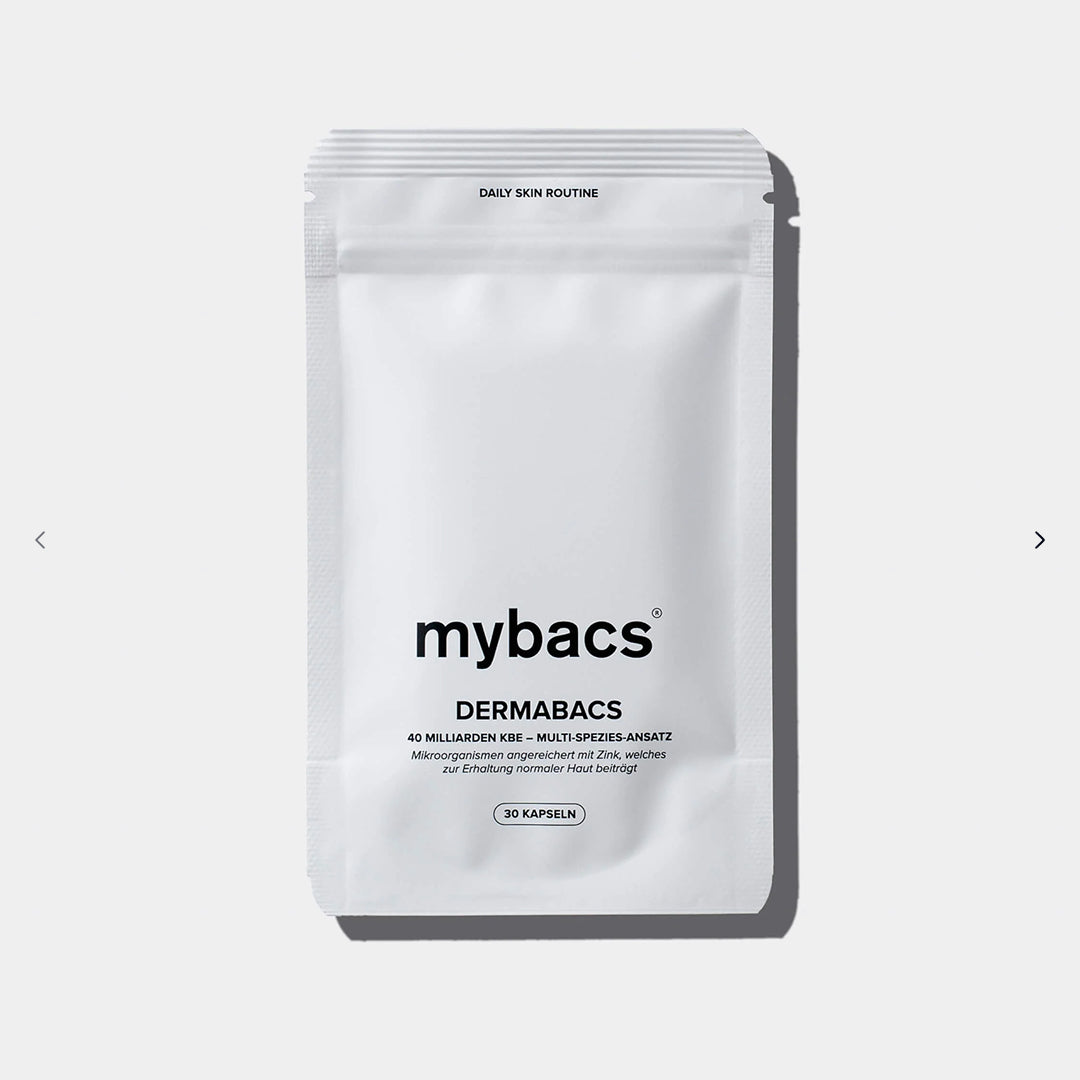Our skin is our largest organ and protects us from external influences such as UV rays, environmental pollution, and pathogens. But sometimes it also needs support from within. For this very reason, we at mybacs® have developed a new product: Dermabacs.
Dermabacs from mybacs® for healthy skin.
Why did we develop Dermabacs?
Because we know that many people suffer from skin problems and are looking for sustainable solutions to combat them. Our Dermabacs are specially developed for people with acne, rosacea, and atopic dermatitis (eczema). They are also suitable for people who want to do something about their skin imperfections. The bacterial strains they contain have been tested in clinical studies and have proven effective against these skin conditions. With 40 billion CFU (colony forming units), one Dermabacs capsule contains a highly effective, unique bacterial formulation.
Who are the Dermabacs suitable for?
Dermabacs are primarily aimed at people suffering from forms of acne, rosacea, and atopic dermatitis. However, they are also suitable for anyone who doesn't have any of the aforementioned conditions and generally wants to support their skin health and improve skin imperfections.
And who are they not suitable for?
Severely immunosuppressed individuals should refrain from taking Dermabacs. This is because immunosuppressed individuals have a weakened immune system, which makes them more susceptible to infections. Although probiotics are generally considered safe and offer a variety of health benefits, they may have potential adverse effects in this case. This is because probiotics contain live bacteria that live in the gut and can thus affect the immune system. For this reason, immunosuppressed individuals should definitely speak with their doctor before taking probiotics. They can help determine if probiotics are safe for you and which type of probiotic is best suited to your specific needs.
Can pregnant women and breastfeeding women use Dermabacs?
We always recommend consulting your treating physician. The reason for this is that there are still insufficient studies on the use of some probiotic strains to make reliable statements. There are some studies that suggest that taking probiotics during pregnancy has many benefits. This is especially true for the child, as it is said to reduce the risk of allergies and atopic dermatitis. However, it is entirely up to each mother to decide whether she feels comfortable taking probiotics. Therefore, we recommend consulting a trusted medical professional before taking them.
Can children and adolescents under 18 use Dermabacs? If so, at what dosage?
Yes, children ages 6 and older can use Dermabacs if there is a family history of skin conditions. If acne is present, we recommend using them from age 9.
What ingredients are contained in Dermabacs?
Dermabacs contain a combination of eight bacterial strains. Each strain has been tested and selected for its effectiveness against skin problems.Additionally, Dermabacs contain 10 mg of zinc, which is known to support skin health, relieve inflammation and redness, and reduce sebum production.
Bifidobacterium breve BR03
Lactobacillus salivarius LS03
Lactobacillus rhamnosus LR05
Lactobacillus salivarius LS01
Lactobacillus casei LC03
Lactobacillus delbrueckii subsp. Bulgaricus LDB01
Bifidobacterium animalis subsp. Lactis BS01
Lactobacillus rhamnosus GG
zinc
What effect do the Dermabacs have and when will I notice something?
The effect of Dermabacs can take between 4 weeks and 4 months, depending on the individual skin and the severity of the disease.
Dermabacs contain probiotics that affect the skin in various ways. In general, the probiotics contained in them boost the immune system and have antioxidant properties, which can have a positive effect on skin health. They also strengthen the skin's protective barrier and systemically reduce allergic potential. This can be particularly relevant for people with atopic dermatitis.
In rosacea, the formation of vasodilation and edema is reduced, and the release of pro-inflammatory messengers is inhibited. The anti-inflammatory effects of probiotics are also evident in acne, as they activate certain immune cells and inhibit messengers that trigger inflammation. Additionally, sebum production is reduced and certain bacteria, such as C. acnes, which is responsible for acne, are inhibited. Overall, Dermabacs can be used for acne, rosacea, atopic dermatitis, and to improve skin health.
In general, Dermabacs can contribute to less redness and irritation, even in people without any of the above-mentioned skin conditions, and can lead to reduced sebum production and improved pores. Overall, the skin appears "cleaner" with continued use..
What does this mean in detail?
1) acne
Probiotics such as Lactobacillus rhamnosus, Lactobacillus plantarum, and Lactobacillus casei can alleviate acne symptoms by inhibiting the production of proinflammatory cytokines, which mediate the development of acne lesions. The anti-inflammatory effects of antibiotics and probiotics can enhance the immune systems involved in the pathogenesis of acne. Probiotics can inhibit inflammation by generating regulatory dendritic cells and T cells and prevent cytokine overproduction. This promising role of probiotics as immunomodulatory or anti-inflammatory agents highlights their potential use in acne therapy in combination with antibiotics.
2) Rosacea
Rosacea is a chronic inflammatory skin disease characterized by redness, papules, and pustules. There is increasing evidence that the gut-skin axis is involved in the pathogenesis of rosacea. There is evidence to support the notion that the gut microbiome plays a role in the inflammatory response of the skin, and there are associations with small intestinal bacterial overgrowth (SIBO) and Helicobacter pylori infection. These findings can be considered therapeutic targets.An in vitro study shows that probiotics can reduce inflammation and improve the skin barrier.
3) Atopic dermatitis
Several studies have reported beneficial effects of probiotics on atopic dermatitis, also known as neurodermatitis (Betsi et al., 2008; Meneghin et al., 2012; Weston et al., 2005; Yesilova et al., 2012). These beneficial effects are thought to occur systemically, with the probiotic microorganisms exerting specific effects in the gut and on epithelial and immune cells with antiallergic potential. Thus, the use of probiotics could have a beneficial effect on health, as suggested by Levkovick et al. (2013).
Intake, recommendations and warnings
It is important to take the capsules continuously for the best effect. The recommended intake is one capsule daily, preferably half an hour before the first meal. It is also possible to take Dermabacs together with the Daily and Dietbacs from mybacs® to increase the colony-forming units (CFU).
We recommend consulting with us before taking Dermabacs if you are taking other mybacs® products or other medications. Some people may be sensitive to zinc, so it's important not to exceed the recommended dosage.
Are there any side effects to Dermabacs?
As with all probiotics, some people may experience an initial reaction. This may manifest itself in symptoms such as bloating, constipation, or diarrhea. This isn't a side effect, but rather has to do with the fact that your gut is suddenly receiving a whole host of new microorganisms, which naturally do just as much work. The gut simply needs a short period of time to find a new and healthy balance. But this is completely normal and should subside after a few days.
Studies
We're proud that our Dermabacs are based on extensive clinical studies. Each of the eight bacterial strains has been tested for its effectiveness in improving skin conditions and has been proven effective. For example, Bifidobacterium breve BR03 was successfully used in a study on patients with atopic dermatitis. In another study, Lactobacillus salivarius LS03 was used to treat acne and demonstrated significant improvements. We want to offer you complete transparency so that you are fully informed and can make your own decisions.
If you would like to learn more about a section of the respective studies, please click through the following links.
Lactobacillus salivarius LS03: https://www.ncbi.nlm.nih.gov/pmc/articles/PMC8850513/
Bifidobacterium breve BR03: https://www.ncbi.nlm.nih.gov/pmc/articles/PMC8850513/
Lactobacillus rhamnosus GG (AD3): https://www.ncbi.nlm.nih.gov/pmc/articles/PMC4178598/
Lacticaseibacillus rhamnosus LR05: https://www.researchgate.net/publication/265964661_Probiotics_as_a_Novel_Adjuvant_Approach_to_Atopic_Dermatitis
Lactobacillus salivarius LS01:
https://pubmed.ncbi.nlm.nih.gov/27087407/
https://pubmed.ncbi.nlm.nih.gov/25291127/
Lactobacillus casei LC03: https://www.ncbi.nlm.nih.gov/pmc/articles/PMC8850513/
Lactobacillus delbrueckii subsp. bulgaricus - LDB01: https://pubmed.ncbi.nlm.nih.gov/23582165/
https://www.ncbi.nlm.nih.gov/pmc/articles/PMC3446166/
Bifidobacterium animalis subsp. lactis BS01: https://www.researchgate.net/publication/265964661_Probiotics_as_a_Novel_Adjuvant_Approach_to_Atopic_Dermatitis
Lactobacillus rhamnosus GG https://www.ncbi.nlm.nih.gov/pmc/articles/PMC4178598/
Overall, Dermabacs are a promising solution for people with the skin diseases and problems mentioned above. By combining eight specially selected bacterial strains with zinc, they offer a natural way to combat these conditions and improve skin health. Want to try Dermabacs? Then simply click the button!





